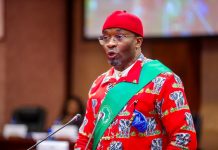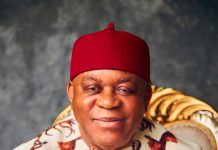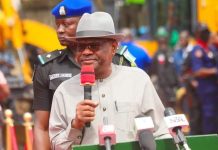The Aguleri/ Umuleri war is one crisis that most people up until now still wonder what could have caused it. This is so because the two communities have high degrees of consanguinity and affinity. A visitor to the area would have to do a great job to distinguish the two communities, both in boundary and linguistics. They are related. There is hardly any family of the two communities that does not have in-law, maternal home, friends and well wishers in both sides of the divide. But despite this relationship, the two communities had gone into serial wars. In this interview with our correspondent, TONY OKAFOR, Chief Ralph Igwa, onetime National President of Nigeria Union of Journalists, reviews the history of the war and how court decisions worsened the situation. Igwa is from Aguleri and played major roles in bringing the war there between 1998-1999 to an end.
What really caused the Aguleri/Umuleri crisis, because we learnt that the people there have blood relation?
The problem there is land. You know, land is a very serious matter in Igboland. If you have been to the area, it is really difficult to say this is Aguleri or this is Umuleri, especially for the people who are not from there. Many people tend to think that the major road is the boundary but that is not necessarily so. As you are going down the left of Umuleri and the right Aguleri, but it is not necessarily so. Of course, if you are going down, to the left, you will see St. Peters, Aguleri, and there are many houses of Aguleri indigenes to the left, but only one house of the Umuleri is on the other side and it’s inside. So it’s a problem of who owns the Otuocha land. As I said, the matter had been in the court since 1933. The Umuleri people have always been going to court, they instituted the first court action, to say that the land belonged to them, and on each occasion, the court had said that the land did not belong to them. This continued until the Privy Council, the last court in the colonial days said the land did not belong to them. Then, before the civil war, Otuocha was gazzetted by the Eastern Nigerian Government. It was gazzetted as Otuocha Aguleri. After the civil war, the Aguleri people decided to assert their ownership and the Umuleri people said no.
Why did they refuse?
Perhaps, they had a better legal opinion on their side. That was because the fact that the court said the land did not belong to them did not mean that it belonged to us.
They have been instituting actions, and the court said no, it did not belong to them, but the court did not say further if the land belonged to us. We were assuming that the land belonged to us legally, so for the first time in 1975, Aguleri people then went to court at Onitsha to say that the land belonged to us, but the court in Onitsha again said the land did not belong to us and did not belong to Umuleri either. So, we went on appeal in Enugu, and the appeal court unanimously said the land belonged to Aguleri. They said that the history of litigation about this land had been between these two communities, and they held that obviously, if the land did not belong to Umuleri, then it belonged to Aguleri. That was the opinion of the appeal court. Umuleri then went on appeal at the Supreme Court; that was in 1985 and the Supreme Court upheld the decision of the High court in Onitsha, that the land did not belong to us. So if it did not belong to two of us, who then owns the land? I don’t know if you get it. The judge in dismissing the case of Umuleri in Onitsha, made one pertinent statement and he said, “In saying that the land did not belong to Aguleri people, I did not say that it belonged to Umuleri people and that if they went out jubilant that the land belonged to them, they and their leaders will bear full responsibility.” That was the judgment of the Onitsha High Court which was upheld by the Supreme Court. So what that means is that it neither belonged to them nor to us. So they now said that we should reenact the old harmonious ties, that no community will claim exclusive right to the land. I have always said, since my practice of journalism that many people are ignorant of many things, you will be surprised that if you go to the National Assembly today, perhaps, there are people who are there who have not read the Nigerian Constitution. Even among journalists, they know the constitution is there, but they have not read it.
What followed next?
The Umuleri people came back and started jubilating that the land belonged to them, just because the court said the land did not belong to us. Even on Aguleri side, how many people have seen and read that judgement? So what brought about the 1995 war was that one of the Umuleri people went to a land considered to be Aguleri land and started building on it.
So he was acting in ignorance of what the law says, so that was what brought about the 1995 crisis, by extension 1999. What I have told you so far is the truth, I have not added and I have not removed, irrespective of my being from Aguleri.
So what happened in 1999?
The 1999 crisis was the most devastating of all, so many things were destroyed and it brought the President of the country to our area. It also brought the National Boundary Commission, irrespective of the fact that it was intra state boundary crisis, but it was never resolved it until the two communities by themselves decided to have a peace committee.
How did the peace committee start?
Here I must commend Senator Emma Anosike of Umuleri. It was during the 2004 Ofala festival that Senator Anosike came to Igwe Aguleri with some of his friends and suggested a peace committee that the war was doing us no good on both sides. Igwe Aguleri asked him if it was his personal opinion or the opinion of his people. In any case, Igwe told him to go back to his people and find out if they supported it, The Igwe promised to find out from the people of Aguleri and it ended there.
Did Senator Anosike come back after meeting his people in Umuleri?
Both communities later agreed to set up a peace committee. That was because litigations had failed, and they resolved to do it themselves, and so the peace committee was inaugurated in 2004.
What was the composition of the committee?
The committee had 20 people from both sides, two co-chairmen from both sides, two co-secretaries from both sides and we were meeting alternately every two weeks in both Aguleri and Umuleri. I am the chairman of the Aguleri group and the chairman of the Umuleri group was a man who was coming from Kano, he is now late. In fact, he died in the course of this.
We were meeting every two weeks and he was coming from Kano, and that is a very far journey. For me, I was coming from Enugu.
How was the committee’s sittings initially?
It was not easy at first, we were banging tables and what was remaining was to fight physically, but at last, everyone understood that nothing was more important than peace and so, we started moving as one family.
When we started, I told them we should concentrate on three areas which I saw as the flash points. These were the location of the present Umuleri town hall and the Victory Cathedral, Umuleri and the Technical School Umuleri. These were the flash points and that was why each time there was a crisis, those three places would be the scene of serious fighting, but I am happy that I was rather naïve, because my colleagues said we should go the whole hog, from the water side to the end of both villages, and it paid off. During the discussions, it was a matter of give and take, we would concede some places to Umuleri, and Umuleri would concede some to us. We said let us forget about the court rulings, let us forget about whatever boundaries we had had before, we accepted that the committee should decide what the boundaries are, we conceded the present Umuleri town hall to them, but when we got to the issue of the Victory Cathedral, it was very contentious.
How?
Before the war, there was Faith Tabernacle, Umuleri. It was very contentious and it held us for a long time until one day Igwe Idigo phoned me and said the elders of Aguleri were in his palace and that instead of that spot causing conflict for a long time, we should concede it to them and we drafted our resolution and conceded it to them. But there was something that happened, we just took the decision and had not reported to the people. We learnt that when the Umuleri people went there to put up a perimeter fencing, Aguleri youths stopped them, and it was a problem. They got in trouble with me on phone, we hurriedly called a meeting of Aguleri people to tell them we had conceded the place to Umuleri, that they also conceded some places to us. So we were doing things on the principle of give and take. In all, I was very impressed by the open mindedness and the quest for peace by the members of the committee on both sides.
Would you say that permanent peace returned to the community after that?
So on the long run, we not only became a family, but we became friends. This was working to the extent that members of the committee were at some point accused of taking bribes to compromise their communities’ stand, we continued until 2010. But Umuleri people pulled out of the committee because they had an internal crisis. They had a change in their town union and so we could not continue.
Would it be correct to say that the crisis came about because of the non definitive judgment of the courts?
To a large extent, yes. They said none of the communities could claim exclusive ownership of the land; another was because of the space of time. Like many people were in doubt as to where exactly was in contention when the community went to court in 1933. So, it’s the court, because of their inability to say the exclusive owners of the land, but perhaps, there is some merit in what the courts said, both sides had lived together for a very long time, and they should have tried to live together as one and rekindle that togetherness.
So, what is the situation now?
Yes, there is peace, but that is not to say that occasionally, there are no flares, here and there, but generally, there is peace. That peace agreement has my signature to it as the chairman of Aguleri, and their chairman signed. Their secretary signed and our secretary signed; our Igwe signed and theirs signed. Even the highest traditional title of both communities signed and Aguleri people are very well aware of this. What we said at the peace committee was that there would be no interference whatsoever from any of the communities, either in terms of membership or whatever… but generally, there is peace.
How would you describe the quantum of destruction during the war?
It was massive.
Has it been quantified by any known body?
Yes. I say this emphatically because I told you I was the secretary of my side. There were three communities involved in the crisis; Umuleri, Aguleri and Umuoba Anam, they gave us a breakdown of the report and we submitted it to the committee and I know it was massive, but I cannot remember now how much it was.
Has government done anything to rehabilitate the communities?
They have not formally done anything to rehabilitate the people of the communities. Nothing has been done in terms of the report we submitted to the government, but there was a very significant committee in the Governor Mbadinuju’s administration, where the persons involved sat down and marshaled out plans. It was not set up to blame any community but to fashion a way out, all communities involved said everything the way it was during the war.
Did the visit of the then President Obasanjo help in anyway?
Yes, I want to believe that it helped. For the president of your country to come to your community, appealing for peace, courtesy demands that you heed his advice. It also showed that what we were doing was no longer a local thing, but was affecting the image of the country, so it helped.
What do you think could be done to ensure lasting peace?
Simple, the two communities should resuscitate the peace committee and there have been moves to that effect. That is because occasionally, there is threat to peace.
Source: punch








